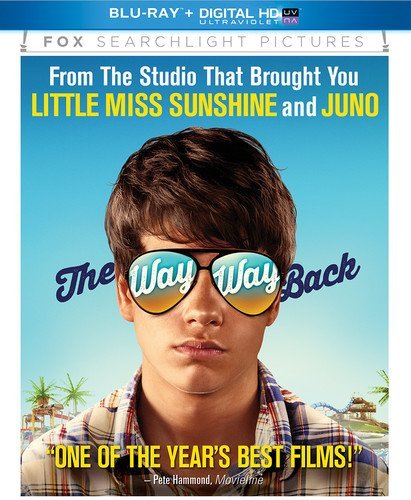
Written by S. Edward Sousa
As far as coming-of-age movies go The Way, Way Back is the exception. Most in the genre fall in one of two camps; the Porky’s, “everybody gets laid until someone has sex with a pie” camp, or the She’s All That “everybody emotionally blossoms until somebody kisses the girl” camp. Both have their merits and occasionally cross stitch a classic like Sixteen Candles, equal parts sexual immaturity and teenage sensitivity. They revel in the milieu of adolescence with grown-ups often serving as the oblivious and aggravating folly. It’s rare for these films to maintain a looseness and sense of humor while tackling complex issues, like navigating the murky waters of adulthood. Yet The Way, Way Back does just this. In fact, the film defies conventions by pitting its adolescent protagonist against the hyper-sexual and compromised lives of middle-aged folk.
Liam James plays Duncan, a slouched-over, pasty-skinned 14-year-old dragged off to the Cape Cod summer home of his mother’s boyfriend, a magnificent Steve Carell as cruel forty-something Trent Ramsey. Free of his trademark earnestness, Carell as Ramsey demeans and reprimands Duncan for the approval of Pam, the boy’s lip-biting, gutless mother played by Toni Collette. This is the crux of the film, Duncan is forced to process his mother’s post-divorce behavior—driven by a misguided newfound sense of freedom—at the expense of his own sense of self. He’s turned off by this casual adulthood, magnified by the drunken and overt libidos of Allison Janney, Rob Corddry, and Amanda Peet who turn in hilarious performances as friends, neighbors, and secret lovers. They celebrate the conservative debauchery of the middle class and for Duncan, a quiet presence in almost every scene, it exalts a side of his mother he does not recognize.
So to get away Duncan scores a job at Water Wizz, a beach-front water park full of carefree employees over thirty managed by Owen, a lively and bro’d up Sam Rockwell who like Carell defies expectations. Duncan finds a sanctuary in the local color and rush of the slides. Writer/director duo Nat Faxon and Jim Rash—who won the Best Adapted Screenplay Oscar with Alexander Payne for The Descendants—cast themselves alongside Maya Rudolph as a cadre of joyous grown-ups, the antidote to Duncan’s home life of compromised maturity. It’s here that Duncan is dragged from his shell, riding to work everyday on a pink bike and vying for the attention of Susanna who, like Duncan, finds adulthood unsettling. Duncan doesn’t learn to grow-up, get laid or even stand-up for himself, but instead learns to be himself.
This simplicity sets The Way, Way Back apart, choosing honesty and vulnerability over an inflated reality. Even when dealing with seasoned themes—infidelity, drug use—the film never takes itself too serious, but instead presents problems and obstacles as surmountable for a pubescent kid. The few Blu-ray supplements provided—a writer/director commentary track is a glaring absence—bolsters the film’s effervescent vibe as Faxon, Rash, and company cut loose on a tour of the water park. The deleted scenes make no case for inclusion, yet speak to efficient nature of the film. In avoiding tropes The Way, Way Back becomes a classic—straightforward, simple and full of heart.